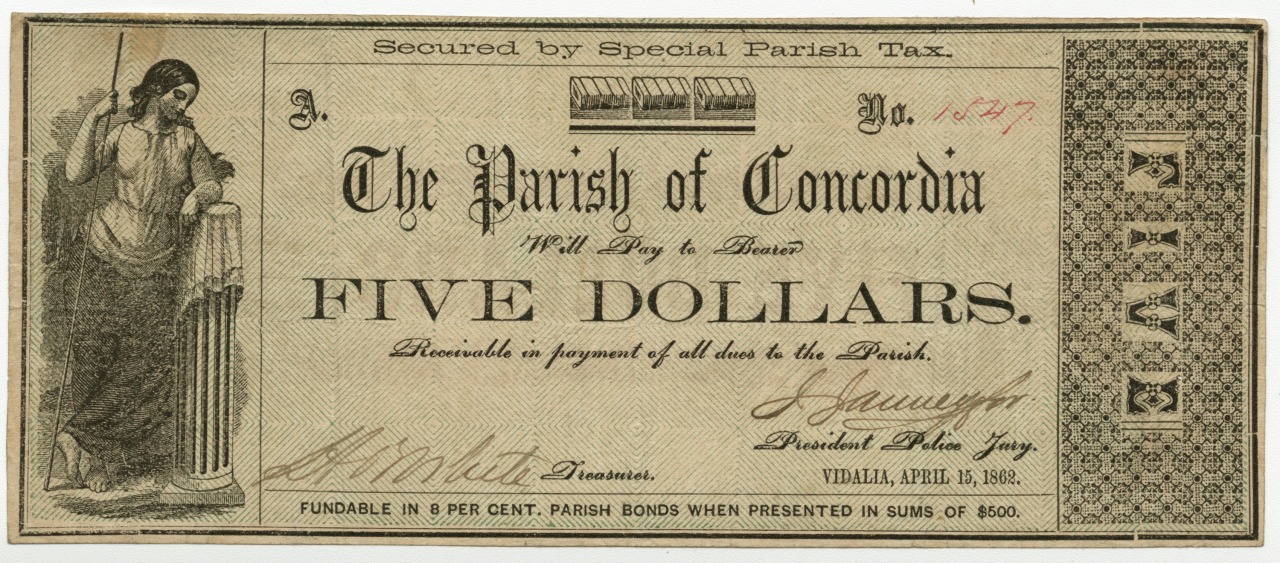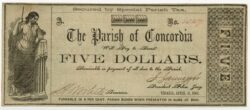Police Juries
This distinct form of government exists in more than half of Louisiana’s parishes.
This entry is High School Civics level View Full Entry

The Historic New Orleans Collection
A five-dollar banknote issued by the Concordia Parish Police Jury in 1862.
What is a police jury, and how were they first established?
Unique in the United States, police juries are elected political bodies that govern more than half of Louisiana’s sixty-four parishes. The police jury serves as the legislative and executive branch of the parish government. As of 2023 there are forty-one parishes with police juries. The other twenty-three parishes have home rule charters that allow other forms of administration, including council-president, council-manager, and consolidated parish/city. A police jury can enact and enforce ordinances and regulations, maintain public works, and levy taxes.
At the time of the Louisiana Purchase in 1803, much of present-day Louisiana was called the Orleans Territory. The Orleans Territory was divided into twelve counties that roughly matched the existing parishes created by the Catholic Church during the French colonial period and the Spanish colonial period. In 1807 these counties were further divided into nineteen parishes. The nineteen parishes continued to be divided as the state’s population grew, which resulted in the sixty-four parishes we have today.
Police juries were originally established to regulate slavery. The original law that established police juries was passed in 1811. The act reads:
“Be it enacted, by the Legislative Council and House of Representatives of the Territory of Orleans . . . That the Parish Juries summoned in the manner and form hereafter prescribed be and that the same are hereby authorized to establish, each in their respective parishes, if they deem it necessary for the police of said parish, a gendarmerie [armed force] whose duty it shall be specially to go after runaway negroes and to maintain good order among the slaves. . . . And be it further enacted, That the parish juries who shall think proper to establish bodies of gendarmerie in their respective parishes, shall have power to lay on the slaves of their said parishes a tax for the keeping of said gendarmerie. And be it further enacted, That the parish meeting, or police jury . . . shall be composed for the future of a jury of twelve inhabitants presided by the parish judge, or in his absence by one of the members of the jury, elected by ballots.”
How do police juries operate today?
After Louisiana became a state in 1812, the law governing police juries was amended to allow parishes to be divided into wards, with each ward electing its own police jurors. Amendments also removed the requirement that each parish have twelve jurors and instead allowed each to decide how many they needed based on population. The presiding parish judge was also replaced by a police jury president elected from the body of jurors. Parish elections for jurors are usually held in odd-numbered years using the open-primary system. (An open primary allows a voter to vote regardless of the candidate or the voter’s party affiliation. For example, a Democrat can vote for a Republican in an open primary.)
Police juries today have broad authority under the state constitution as long as their actions are legal and approved by voters. The Police Jury Association of Louisiana was established in 1924 to improve parish government through advocacy and education. The organization states that police juries:
” . . . exercise over fifty different functions and powers, including road and bridge construction and maintenance, drainage, sewerage, solid waste disposal, fire protection, recreations and parks, parish prison construction and maintenance, road lighting and marking, many water works, health units, and hospitals, etc. They also house and maintain the courts and the Offices of the Assessor, Coroner, Clerk of Court, Registrar of Voters, District Attorney, and the Sheriff. They promote economic development and tourism in their parishes, regulate various business activities, and administer numerous state and federal programs on the parish level.”
Police juries also have authority to enforce ordinances by issuing fines through civil courts.
In recent years some parishes have replaced police juries with other forms of local government, with separate executive and legislative bodies. This change has occurred especially in large cities and suburbs, yet police juries still exist in many of the state’s rural regions.
Parishes using the police jury system: Acadia, Allen, Assumption, Avoyelles, Beauregard, Bienville, Bossier, Calcasieu, Caldwell, Cameron, Catahoula, Claiborne, Concordia, DeSoto, East Carroll, East Feliciana, Evangeline, Franklin, Grant, Jackson, Jefferson Davis, La Salle, Lincoln, Madison, Morehouse, Natchitoches, Ouachita, Pointe Coupee, Rapides, Red River, Richland, Sabine, St. Helena, Tensas, Union, Vermilion, Vernon, Webster, West Carroll, West Feliciana, Winn
Parishes using the council-president system: Ascension, Iberia, Iberville, Jefferson, Lafourche, Livingston, Plaquemines, St. Bernard, St. Charles, St. James, St. John the Baptist, St. Landry, St. Martin, St. Mary, St. Tammany, Tangipahoa, Washington, West Baton Rouge
Parishes using the consolidated parish/city system: Orleans Parish and New Orleans; East Baton Rouge Parish and Baton Rouge; Lafayette Parish and Lafayette; Terrebonne Parish and Houma
Parishes using the council-manager system: Caddo
